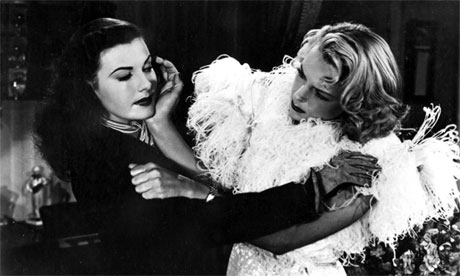“You write and you discover. All art comes from the unconscious. You keep doing it and things keep coming up and they take form. Then your consciousness sees the form and works with it. But what comes out is something else.”
Archiv der Kategorie: International
Kolumne: Crimewave
Sarah Weinman writes the Crimewave column every month for the Post. This month she read Barbara Fradkin’s “The Whisper of Legends”, Robin Spano’s “Death’s Last Run” and Jack Batten’s “Take Five”.
Rezension: Thane Rosenbaum: “Payback: The Case for Revenge”
Thane Rosenbaum shows how justice is inextricably linked to revenge, which he argues is both “morally right” and a “deeply internalized” instinct “as innate to man as breathing, having sex, falling in love, and making war.”
Rezensionen: Jones, Monroe, Nakamura, Perry, Roslund-Hellstrom, Stanley
New reviews of Tobias Jones’s “Death of a Showgirl”, Aly Monroe’s “Black Bear”, Roslund and Hellstrom’s “Two Soldiers”, Michael Stanley’s “Dead Harvest”, Anne Perry’s “Midnight at Marble Arch” and Fuminori Nakamura’s “The Thief”.
Rezension: Benjamin Percy: “Red Moon”
The lycans in “Red Moon” don’t transform on the full moon. Though they share many of the same features as traditional werewolves – their appearance, bestial duality and infectious bite among them – the lycans of Percy’s second novel can generally control their episodes.

Artikel: Music to murder to: crime writers on their killer soundtracks
You’re more likely to see other crime writers at gigs than literary events, so what role does music have in the creation of crime fiction?
Rezension: John le Carré: “A Delicate Truth”
Few writers know a given territory as well as John le Carré knows the world of covert missions, encrypted phones and distrustful professional unions. It’s as if he sleeps with this stuff, brushes his teeth with it, never has a quiet moment apart from it.
Rezension: Claire Messud: “The Woman Upstairs”
Claire Messud’s latest novel, “The Woman Upstairs,” is an incongruous mashup of a very self-consciously literary novel and one of those psychological horror films like “Single White Female” in which someone, ominously, is not who she appears to be.
Rezension: Claire Messud: “The Woman Upstairs”
Messud, the least myopic of artists, has written a tale whose uneasy energy derives from the imploded diffidence of its protagonist, a woman whose fault lies not in the absence of ruth, but in her failure to fully realize herself.
Rezension: Claire Messud: “The Woman Upstairs”
Every new Claire Messud novel is a reason to rejoice. “The Woman Upstairs” follows up her superb “The Emperor’s Children”,which which was set in New York City in late 2011 and was as close to an instant classic as American literature has produced in this century.
Rezension: Claire Messud: “The Woman Upstairs”
Reading the title of Claire Messud’s latest novel, anyone of a literary turn of mind will immediately think of the madwoman in the attic, the 19th century’s best-known “woman upstairs.”
Rezension: Peter Lovesey: “The Tooth Tattoo”
String quartet aficionados should hasten to read Lovesey’s fascinating “The Tooth Tattoo.” Strictly speaking, the novel is a police procedural, but the kicker is that the prime suspects in three murders are the members of a world-class string quartet called Staccati.
Rezension: John Goldbach: “The Devil and the Detective”
“The Devil and the Detective”, John Goldbach’s debut novel (though in word-count and content it feels a little closer to novella). Robert James, its protagonist, is a lonesome, contemplative gumshoe with a romantic streak, a bad diet and a paucity of clients.
Rezension: Parker Bilal: “Dogstar Rising”
The second outing for Parker Bilal’s Sudanese detective Makana, a refugee scraping along on a dilapidated houseboat in Cairo, has all the satisfying complexities of his first, “The Golden Scales”.
Rezension: Keith Ridgway: “Hawthorn and Child”
Hawthorn and Child are not father and son, but two police detectives. Child is cool, good-looking, black, married, the sensible, no-bullshit member of the duo; Hawthorn is neurotic, gay, and prey to bad dreams and fits of weeping.
The Story Behind the Story: “The Hunting Ground,” by J. Robert Janes
This 42nd entry in The Rap Sheet’s “Story Behind the Story” series reintroduces us to Canadian author J. Robert Janes. In this essay he writes about “The Hunting Ground”, his new standalone thriller set during the German occupation of France during World War II.
Rezensionen: John le Carré: “A Delicate Truth”
Besprechungen in der New York Times von Michiko Kakutani und Olen Steinhauer, National Post von Philip Marchand und im Telegraph von Jon Stock (bitte jeweils auf den Namen des Rezensenten klicken).

Interview: Ian McEwan
Ian McEwan tells Jon Stock about the pleasure of writing a spy novel with a twist – and why he believes it’s high time John le Carré won the Booker Prize.

Artikel: CIA agents use pseudonyms to review spy fiction
CIA spooks regularly review spy fiction for a classified in-house journal, rating John le Carré above American writers for his veracity, reports Jon Stock.
Rezensionen: Perry, Morrell, R.B. Chesterton, Mapstone
Marilyn Stasio reviews several new crime novels like Anne Perry’s “Midnight at Marble Arch,” David Morrell’s “Murder as a Fine Art,” R. B. Chesterton’s “The Darkling” and David Mapstone’s “The Night Detectives.”